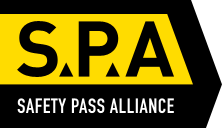A health & safety ‘passport’ for contractors visiting customers’ premises is being launched at Maintec in late March.
Developed to help contractors meet new requirements, the new passport was created by the UK’s leading authority in this field SPA (Safety Pass Alliance), whose courses have helped reduce accidents by as much as 75 per cent.
With more companies requiring proof that visiting workers have been trained in health & safety, contractors adopting the passport scheme will have the edge when pitching for contracts.
SPA managing director Ray Gibbs, whose Warwickshire-based company runs similar passport schemes for many major corporations, said a growing number of blue chip companies were using passports to help reduce accidents, costs and to improve efficiency in their companies.
Mr Gibbs said: “Most companies need contractors to visit their premises on a regular basis to carry out such vital work as repairs, maintenance, installation of new equipment and new buildings. Unfortunately, they can pose an unknown risk as it’s not always possible to check that they have been trained properly to an acceptable level of health & safety.
“This is where SPA comes in. Contract workers and company employees who complete our Sector training course can prove their knowledge of basic health & safety by showing their passport, which is similar to a driving licence, complete with a tamper-proof photograph to reduce fraud.
The course, which was first introduced two years ago and is currently being used by companies such as Balfour Beatty WorkPlace, Johnson Controls and Vinci Construction, is being re-launched with a new programme during Maintec at the NEC, Birmingham, between March 29 – 31.
SPA clients such as Nestle, whose 200 sites around the UK are visited each year by thousands of workers from 750 contractors, will only do business with those companies whose personnel carry the passports.
Nestle group found that the passport not only reduced costs – as it takes less time to conduct safety inductions – but had a dramatic effect on accident rates among visiting contractors, which reduced by almost 70 per cent over a two year period.
SPA’s course will ensure that all contractors have a thorough grounding in general health & safety, covering topics such as accidents, organising for safety, key health & safety requirements, risk assessment and potential hazards such as fire, electricity, plant & machinery, hand tools, and hazardous substances in addition to risks associated within a specific sector.
Details of the one-day training course can be obtained from Safety Pass Alliance (SPA),Unit 3, The Court, Holywell Business Park, Northfield Road, Southam, Warwickshire CV47 0FS Tel: (01926) 817450 or by visiting www.safetypassports.co.uk
Issued by Newsline PR. Tel: 01926 888308
February 2011



















